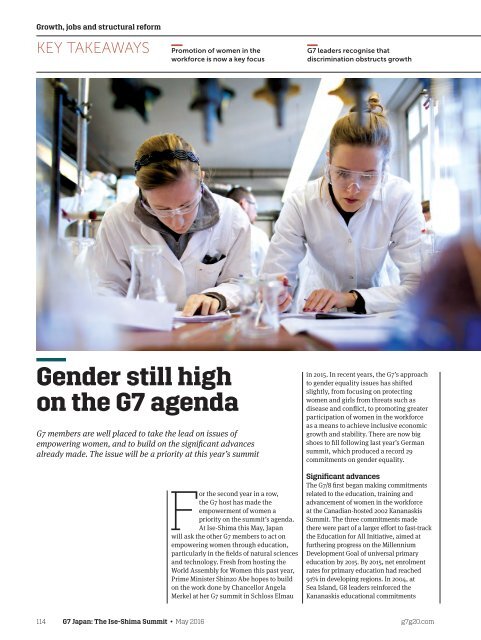G7_JAPAN
Create successful ePaper yourself
Turn your PDF publications into a flip-book with our unique Google optimized e-Paper software.
Growth, jobs and structural reform<br />
KEY TAKEAWAYS<br />
Promotion of women in the<br />
workforce is now a key focus<br />
<strong>G7</strong> leaders recognise that<br />
discrimination obstructs growth<br />
Gender still high<br />
on the <strong>G7</strong> agenda<br />
<strong>G7</strong> members are well placed to take the lead on issues of<br />
empowering women, and to build on the significant advances<br />
already made. The issue will be a priority at this year’s summit<br />
For the second year in a row,<br />
the <strong>G7</strong> host has made the<br />
empowerment of women a<br />
priority on the summit’s agenda.<br />
At Ise-Shima this May, Japan<br />
will ask the other <strong>G7</strong> members to act on<br />
empowering women through education,<br />
particularly in the fields of natural sciences<br />
and technology. Fresh from hosting the<br />
World Assembly for Women this past year,<br />
Prime Minister Shinzo Abe hopes to build<br />
on the work done by Chancellor Angela<br />
Merkel at her <strong>G7</strong> summit in Schloss Elmau<br />
in 2015. In recent years, the <strong>G7</strong>’s approach<br />
to gender equality issues has shifted<br />
slightly, from focusing on protecting<br />
women and girls from threats such as<br />
disease and conflict, to promoting greater<br />
participation of women in the workforce<br />
as a means to achieve inclusive economic<br />
growth and stability. There are now big<br />
shoes to fill following last year’s German<br />
summit, which produced a record 29<br />
commitments on gender equality.<br />
Significant advances<br />
The <strong>G7</strong>/8 first began making commitments<br />
related to the education, training and<br />
advancement of women in the workforce<br />
at the Canadian-hosted 2002 Kananaskis<br />
Summit. The three commitments made<br />
there were part of a larger effort to fast-track<br />
the Education for All Initiative, aimed at<br />
furthering progress on the Millennium<br />
Development Goal of universal primary<br />
education by 2015. By 2015, net enrolment<br />
rates for primary education had reached<br />
91% in developing regions. In 2004, at<br />
Sea Island, G8 leaders reinforced the<br />
Kananaskis educational commitments<br />
114 <strong>G7</strong> Japan: The Ise-Shima Summit • May 2016 g7g20.com
















